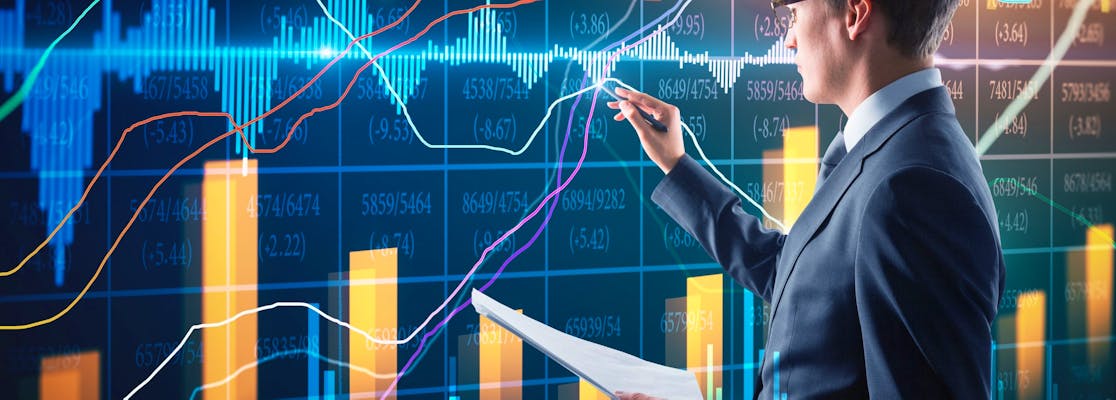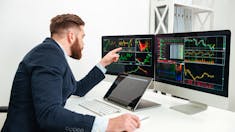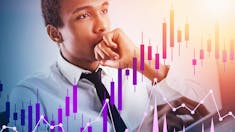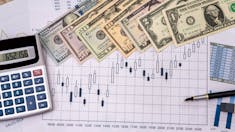10 Ways to be a Forex Pro in 2026
All products and services featured are independently selected by WikiJob. When you register or purchase through links on this page, we may earn a commission.
- A list of the Top Forex and CFD Brokers for January 2026:
- Description of the Best Forex and CFD Brokers for January 2026
- What Is a Forex Pro?
- Types of Traders
empty
empty
empty
- 10 Ways to be a Forex Pro
empty
empty
empty
empty
empty
empty
empty
empty
empty
empty
- Frequently Asked Questions
- Final Thoughts
A list of the Top Forex and CFD Brokers for January 2026:
Description of the Best Forex and CFD Brokers for January 2026
1. Plus500
Pros
- No buy/sell commissions and tight spreads
- Leverage of up to 1:30
- FREE unlimited Demo
- 2,800+ CFD trading instruments
- Real-time quotes and advanced analytical tools
- Fast and reliable order execution
Cons
- No API integrations
- No social copy trading
Recommended for: Experienced traders
Plus500 instruments are available for trading exclusively via CFDs and the service offered on the platform is CFD-based.
Another user-friendly entry on our list of the best forex and CFD brokers in the UK is Plus500, providing an easy-to-use and accessible service.
You’ll find over 60 CFD currency pairs with competitive spreads, no commission and available leverage of up to 1:30.
Although MetaTrader and cTrader are not available, Plus500’s own platform is very user-friendly. It comes with a range of intuitive risk management features and is available on web and mobile.
Plus500 requires a minimum deposit of £100 if using a credit or debit card, and £500 if using bank transfer.
Plus500 UK Ltd authorized & regulated by the FCA (#509909).
2. Pepperstone
Pros
- Extensively regulated
- No minimum deposit
- Low fees and mostly free withdrawals
- Good customer service
Cons
- No investor protection for clients outside UK, EU and EEA
- Withdrawal fee for international bank wires
- CFDs only
Pepperstone is widely recognized as one of the top forex brokers globally, praised for its competitive trading conditions, advanced platforms, and strong regulatory framework.
Pepperstone is known for offering some of the tightest spreads in the industry. For instance, their Razor account offers spreads starting from 0.0 pips on major currency pairs like EUR/USD, combined with low commissions. This pricing structure is particularly attractive for high-frequency traders and scalpers who benefit from reduced trading costs.
The broker provides leverage up to 1:500 for professional traders, allowing them to control larger positions with a smaller amount of capital. This high leverage can amplify both potential profits and risks, making it crucial for traders to manage their positions carefully.
Pepperstone supports the widely-used MT4 and MT5 platforms, known for their robust charting tools, extensive range of technical indicators, and support for automated trading through Expert Advisors (EAs). These platforms are ideal for both novice and experienced traders who rely on advanced technical analysis and algorithmic trading.
cTrader is another powerful platform provided by Pepperstone, offering an intuitive interface and sophisticated trading features. It includes advanced order management tools, detailed charting capabilities, and support for automated trading through cTrader Automate (formerly cAlgo).
Pepperstone’s integration with TradingView offers enhanced charting tools and access to a large social trading community. This platform is particularly beneficial for traders who rely on detailed technical analysis and want to leverage insights from other traders.
Pepperstone is regulated by multiple top-tier financial authorities, ensuring a secure and transparent trading environment.
3. Saxo
Pros
- Heavily regulated
- Good product portfolio
- Low forex fees
- No withdrawal or inactivity fees
Cons
- Does not accept US clients
- High fees for options, futures and bonds
Saxo is a highly regarded platform for Forex trading, offering an extensive and well-equipped environment tailored for Forex traders of all experience levels.
Saxo provides access to 185 FX pairs, encompassing majors, minors, and exotics, plus spot metals. This wide range of currency pairs allows traders to take advantage of opportunities in both well-established and emerging markets.
Saxo offers very tight spreads, starting from as low as 0.4 pips for major FX pairs. This competitive pricing structure is especially beneficial for active traders, who also enjoy even lower rates, reducing the cost of trading and potentially increasing profitability.
Saxo ensures high-quality liquidity, which leads to higher fill rates and fewer premature stop-outs. This level of liquidity also enables significant price improvements, ensuring that traders can execute trades at the best possible prices.
Recognizing the importance of risk management in Forex trading, Saxo incorporates a comprehensive set of risk management features. These tools help traders manage their exposure and safeguard investments against market volatility.
Saxo allows traders to engage in Forex trading both on the spot market and through derivatives. This flexibility enables traders to tailor their strategies according to their risk appetite, trading style, and financial goals.
The platform provides a feature known as 'Market Movers,' which shows the day's biggest gains and losses across the forex and spot metals markets. This snapshot of market mood helps traders gauge sentiment and adjust their strategies accordingly.
4. IG
Pros
- Highly regulated
- MetaTrader 4 (MT4)
- Over 10,000 instruments
- Available in the UK and US
- 24/7 customer support
Cons
- High fees
- No deposit compensation scheme for US accounts
- No copy trading
- Inactivity fees
IG is a great share trading platform for beginners thanks to its user-friendly interface and extensive educational resources.
Pros of IG include a wide range of trading instruments and markets, as well as the ability to access multiple account types and trading platforms. The platform also offers a demo account for beginners to practise trading strategies before investing real money.
However, IG isn’t the cheapest share trading platform, with relatively high trading fees and a minimum deposit requirement of £250 when paying by credit/debit card or PayPal.
In terms of additional fees, IG charges a commission fee for share trading, starting from £8 per trade. There’s also a custody fee of 0.25% per year for holdings of £250 or more.
Overall, IG is a solid choice for beginners looking for a user-friendly platform with extensive educational resources, but investors should be aware of its fees and minimum deposit requirements.
What Is a Forex Pro?
Essentially, forex trading is when currencies are exchanged.
The concept is nothing new. Anyone wanting to buy something from another country will have to change their currency into another one. Anyone going on vacation exchanges their money into that of the country they are visiting.
With forex trading, you are exchanging one currency into another in the hope of making a profit.
Each day the forex market makes $6.6 trillion worth of transactions.
What makes forex trading so appealing is that there is no central marketplace. Instead, it is all electronic. This means that trades happen all over the world, at all times of the day and night.
The forex market is open 24 hours a day, Monday to Saturday afternoon. As forex trades in every location, when one market closes, another opens, making it very active and exciting.
However, there is more to becoming a forex pro than learning the basics and hoping for the best.
All top-performing traders are:
- Disciplined
- Motivated
- Dedicated
They have spent years learning their craft, perfecting their strategy and have developed a trader's mindset.
Types of Traders
Technical Trading
To become a forex pro, you must develop excellent technical analysis and numerical reasoning skills.
Technical traders spend time looking at indicators, such as price pattern analysis, to find market trends.
However, some hold the belief that these indicators overcomplicate the charts.
The most successful traders are aware of all the indicators, but they keep things simple by only using the tools they truly need.
Automated Trading
Generally speaking, most traders will not solely use automated trading.
The automated systems use an algorithm, making them difficult to adapt when the market makes an abrupt move.
Instead, they will use automated trading in the background as extra analysis.
Fundamental Trading
Fundamental trading requires the use of economic news to steer decisions. Markets react to changes in political leadership, natural disasters and companies experiencing problems.
The markets also react to the anticipation of these news updates.
While news updates can significantly influence market prices, the data is speculative. Therefore, traders will use fundamental analysis alongside their technical data to confirm a decision.
10 Ways to be a Forex Pro
1. Manage Your Money
When trading forex, it is non-negotiable to manage risk.
The most effective way to do this is never to risk more than 1% of your capital.
You can back this up by using risk assessment tools such as stop-loss and take-profit orders.
Setting a stop-loss and a take-profit allows you to set a closing price for your trade.
Even if you are not present, the trade will stop when either requirement is met.
While stop-losses are not always guaranteed – sometimes the market behaves unpredictably and uncontrollably – they do limit your exposure to risk by closing a trade before you lose too much money.
Also, be aware of any hidden fees and make sure you know where every cent is going.
2. Regulate Your Expectations
When you start trading, it is tempting to focus solely on profits, but this can lead to many problems such as overtrading and, ironically, losses.

Setting goals based on profit alone can lead to stress, anxiety and poor decisions. When trading forex, ensure your goals are attainable.
Forex is not a get-rich-quick scheme, so pushing yourself to make a million in four months is not realistic.
The best traders set SMART goals, such as:
- 'Make a 12% ROI, generate $5,000 in profit'
- 'Gain 40 pips every 10 days'
They also decide their long-term goals first and make smaller goals month-by-month to help them get there.
Once you have clear, attainable goals, you can start building your strategy and picking your tools.
3. Develop a Winning Strategy
Explore different strategies and tools until you find one that works for you and be prepared to use several strategies.
One strategy might work on a currency pair in one market, but in a different market, the same pair might need another strategy.
To be successful, focus on creating a strategy in line with your risk profile. Study all the tools and techniques to see how they can become part of your strategy.
Once you have found a strategy you think will work, test it on your favorite markets until you are confident it is a success.
4. Stay Up-to-Date
Keeping up with market news and economic releases is vital if you want to succeed as a forex trader.
Markets are influenced by bank announcements, political events and economic news. Sometimes the anticipation of an announcement is enough to make the markets react.
Staying on top of the news will keep you prepared for any changes in your trades.
News announcements are known as fundamental data. Use it with your technical data to create a complete picture of the market.
5. Keep a Record
Regardless of what you trade, where you trade and how, knowledge and understanding will make you a top trader.
The best way is to keep a record of your trades and results.
Write down any meaningful information and the lessons you learned. This enables you to refine your strategies to improve your outcomes.
Make a habit of journaling your trades as soon as you have made one.
At the end of each week and month, analyze your performance to see what you can improve and shape your next set of goals.
6. Develop a Trading Mindset
The best traders recognize when strategies are not working.
They do not let fear or greed dictate their decisions; instead, they stay calm and rely on their strategies and knowledge.
They are dedicated to their craft and dare to try different things, testing innovative techniques.
Work on developing this level of discipline if you want to be a forex pro.
7. Accept that Loss is Inevitable
Success does not mean that you will never experience a loss. Making a profit on all your trades is not possible, and losses are inevitable.
It takes a lot to admit when you have made a mistake or need to change something. It also takes a lot of strength to close a trade early to minimize losses or to see a trade through despite its current situation.
Accepting that losses will happen makes it easier for you to recover and make smart decisions.
8. Avoid Overtrading
Many people want to become profitable in the shortest time. So, they look for money-making opportunities where there are none. This is overtrading.
The two most common types are:
- Trading too often
- Trading too much volume
While frequent trading can increase your chances of profit, it can also increase your losses. Smart traders do not need to make lots of trades to turn a profit; they just need to make the right ones.
It is true that buying and selling the same forex can be a valid strategy, it is risky and unless you know what you are doing you can easily slip into overtrading.
Follow your trading strategy – it will keep you from overtrading so long as you have the discipline to stick to it.
9. Be Selective
Be particular and selective with:
- Your trades
- The markets you choose
- The trading platform you use
All forex pros are selective when it comes to their work as they want to avoid being associated with the wrong people/companies/markets.
A strong trading and risk management strategy will help inform your decisions. But before making any trade, research the company and market to make sure it aligns with your values.
10. Maintain a Healthy Work-Life Balance
Trading forex can have you working around the clock. But it is important to create a healthy work-life balance.
The top forex traders all say they spend just as much time relaxing as they do trading.
They do this because they know that trading is mentally draining and to make the best decisions, you need to be performing at your best.
Living off caffeine and take-outs while spending hours looking at market analysis will not yield the best results.
Make a schedule so you can see where your focus should be and remember to include:
- When you need to be online for optimal trading times
- At least four exercise sessions a week
- Time with friends and family
- Time studying the markets
- Time for your other hobbies
- Time for meal preparation and grocery shopping
Pro-rated forex trading refers to the practice of calculating profits or losses based on the time period a trade was open.
For example, if a trader closes a trade halfway through the day, the profit or loss will be pro-rated based on the number of hours the trade was open.
To become a pro forex trader, it's important to develop a solid understanding of the fundamentals of the forex market, including economic indicators, technical analysis and risk management.
This can be achieved through a combination of self-study, mentorship and practice trading with a demo account.
Also, developing strong emotional control and discipline is essential for successful trading.
Reading forex charts like a pro involves understanding the key technical indicators and patterns that can be used to identify potential trading opportunities.
This includes understanding support and resistance levels, trend lines, candlestick patterns and other technical indicators such as moving averages and oscillators.
There are several trading platforms that are popular among pro forex traders, including MetaTrader 4 (MT4), MetaTrader 5 (MT5) and cTrader.
These platforms offer advanced charting tools, a range of technical indicators and the ability to automate trading strategies through the use of Expert Advisors (EAs).
The win rate of pro forex traders can vary widely depending on their individual trading strategies and risk management practices.
While some traders may have a high win rate, others may have a lower win rate but still be profitable due to their ability to manage risk and control losses.
Pro forex traders typically require a reliable and fast internet connection to ensure they can execute trades quickly and efficiently.
This may involve using a dedicated internet connection or a high-speed broadband connection with low latency.
Additionally, having a backup internet connection can help ensure uninterrupted trading in the event of an outage or other technical issue.
Professional forex traders may use a variety of technical indicators to analyze market trends and identify potential trading opportunities.
Commonly used indicators include moving averages, relative strength index (RSI), stochastic oscillator and the MACD.
However, it's important to note that the specific indicators used may vary depending on the individual trader's strategy and preferences.
Studying forex charts can be a useful tool in developing a deeper understanding of market trends and identifying potential trading opportunities.
However, becoming a professional forex trader requires a broader range of skills, including a strong understanding of economic indicators, risk management and emotional control.
It's also important to gain practical experience through practice trading and mentorship.
Successful forex traders require a range of skills, including a deep understanding of economic indicators and market trends, strong analytical skills, the ability to manage risk effectively and emotional control.
In addition to these technical skills, successful forex traders must be able to maintain discipline and focus, adapt to changing market conditions and maintain a long-term perspective.
The amount that a professional forex trader can earn varies widely depending on a range of factors, including the individual trader's skill level, trading strategy and risk management practices.
While some traders may earn significant profits, others may struggle to achieve consistent profitability.
Experiencing losses is an inevitable part of forex trading, and professional traders must be able to manage these losses effectively to maintain long-term profitability.
This may involve developing a robust risk management strategy, setting strict stop-loss orders and maintaining emotional control to avoid making impulsive decisions.
There are several forex brokers that are popular among professional traders, including IC Markets, Pepperstone and FXTM.
These brokers typically offer a range of advanced trading tools and features, including low spreads, high leverage and access to a range of trading platforms.
Ultimately, the choice of broker will depend on the individual trader's specific needs and preferences.
Final Thoughts
There is no quick route to becoming a forex pro. It takes time, dedication and a lot of trial and error.
Following these 10 steps will help you become a forex pro, but remember:
- Establish your goals so you have a clear focus
- Your money is important. Keep track of where it all goes and stick to your risk management strategy
- No two traders are the same. Do not compare your experience to another. They may have more time or resources at their disposal or a better overall understanding
- What works for one may not work for you—trial strategies and techniques to find what works for you and your goals
WikiJob does not provide tax, investment or financial services and advice. The information is being presented without consideration of the investment objectives, risk tolerance or financial circumstances of any specific investor and might not be suitable for all investors. Past performance is not indicative of future results. Investing involves risk including the possible loss of principal.








